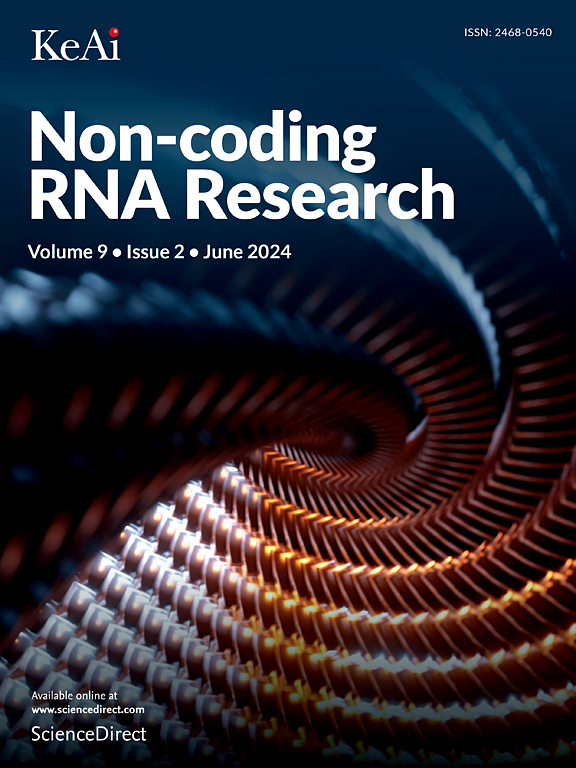Exosome-derived hsa_circ_0007132 promotes lenvatinib resistance by inhibiting the ubiquitin-mediated degradation of NONO
IF 5.9
3区 生物学
Q1 BIOCHEMISTRY & MOLECULAR BIOLOGY
引用次数: 0
Abstract
Hepatocellular carcinoma (HCC) is a highly heterogeneous solid tumor, with its incidence showing a troubling upward trend over the past decade. Lenvatinib is one of the first-line medications for treating advanced HCC, however, the development of resistance significantly undermines its potential to improve patient prognosis. In recent years, exosomal circRNAs have been implicated in the resistance mechanisms of various cancers, yet their role in mediating lenvatinib resistance (LR) remains largely unexplored. In this study, we identified hsa_circ_0007132, which is upregulated in the serum exosomes of HCC patients exhibiting progressive disease (PD) following lenvatinib treatment. Subsequently, we employed LR cell lines to conduct both in vitro and in vivo experiments, which provided compelling evidence that hsa_circ_0007132 significantly promotes LR in HCC. Mechanistically, hsa_circ_0007132 interacts with the NONO protein, impairing its ubiquitination and leading to increased stability and upregulation of NONO expression, thereby enhancing NONO-mediated nuclear export of ZEB1 mRNA and elevating ZEB1 protein expression, which ultimately contributes to LR. In summary, our findings unveil a critical mechanism through which HCC mediates tumor progression and LR via exosomal hsa_circ_0007132, while also emphasizing that targeting NONO may represent a promising therapeutic strategy to overcome LR.
外泌体衍生的hsa_circ_0007132通过抑制泛素介导的NONO降解来促进lenvatinib耐药性
肝细胞癌(HCC)是一种高度异质性的实体肿瘤,其发病率在过去十年中呈现出令人不安的上升趋势。Lenvatinib是治疗晚期HCC的一线药物之一,然而耐药的发展显著削弱了其改善患者预后的潜力。近年来,外泌体环状rna与各种癌症的耐药机制有关,但它们在介导lenvatinib耐药(LR)中的作用仍未被广泛探索。在这项研究中,我们发现hsa_circ_0007132在lenvatinib治疗后出现进展性疾病(PD)的HCC患者的血清外泌体中表达上调。随后,我们利用LR细胞系进行了体外和体内实验,提供了令人信服的证据,证明hsa_circ_0007132在HCC中显著促进LR。从机制上讲,hsa_circ_0007132与NONO蛋白相互作用,损害其泛素化,导致NONO表达的稳定性增强和上调,从而增强NONO介导的ZEB1 mRNA的核输出,提高ZEB1蛋白的表达,最终导致LR。总之,我们的研究结果揭示了HCC通过外泌体hsa_circ_0007132介导肿瘤进展和LR的关键机制,同时也强调靶向NONO可能是克服LR的一种有希望的治疗策略。
本文章由计算机程序翻译,如有差异,请以英文原文为准。
求助全文
约1分钟内获得全文
求助全文
来源期刊

Non-coding RNA Research
Medicine-Biochemistry (medical)
CiteScore
7.70
自引率
6.00%
发文量
39
审稿时长
49 days
期刊介绍:
Non-coding RNA Research aims to publish high quality research and review articles on the mechanistic role of non-coding RNAs in all human diseases. This interdisciplinary journal will welcome research dealing with all aspects of non-coding RNAs-their biogenesis, regulation and role in disease progression. The focus of this journal will be to publish translational studies as well as well-designed basic studies with translational and clinical implications. The non-coding RNAs of particular interest will be microRNAs (miRNAs), small interfering RNAs (siRNAs), small nucleolar RNAs (snoRNAs), U-RNAs/small nuclear RNAs (snRNAs), exosomal/extracellular RNAs (exRNAs), Piwi-interacting RNAs (piRNAs) and long non-coding RNAs. Topics of interest will include, but not limited to: -Regulation of non-coding RNAs -Targets and regulatory functions of non-coding RNAs -Epigenetics and non-coding RNAs -Biological functions of non-coding RNAs -Non-coding RNAs as biomarkers -Non-coding RNA-based therapeutics -Prognostic value of non-coding RNAs -Pharmacological studies involving non-coding RNAs -Population based and epidemiological studies -Gene expression / proteomics / computational / pathway analysis-based studies on non-coding RNAs with functional validation -Novel strategies to manipulate non-coding RNAs expression and function -Clinical studies on evaluation of non-coding RNAs The journal will strive to disseminate cutting edge research, showcasing the ever-evolving importance of non-coding RNAs in modern day research and medicine.
 求助内容:
求助内容: 应助结果提醒方式:
应助结果提醒方式:


